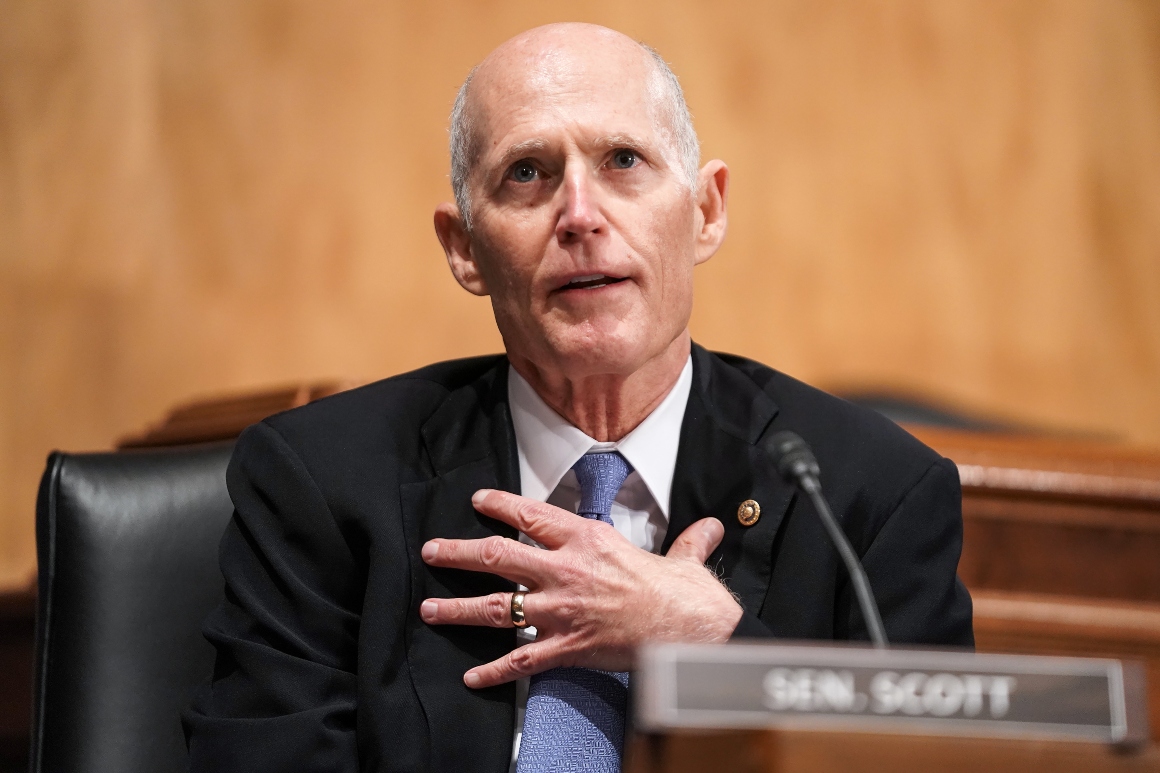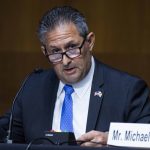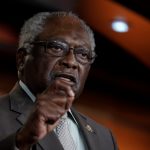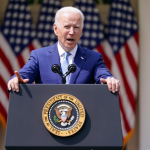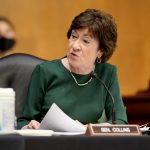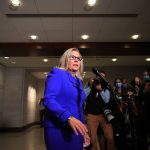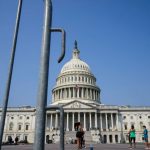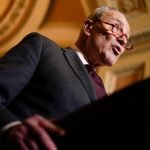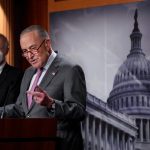Sen. Rick Scott has been chair of the Senate GOP’s campaign committee for all of one week, and some Republicans are already concerned that Scott has dug the party a hole for the 2022 midterms.
Scott officially took over the National Republican Senatorial Committee after the GOP’s two losses in Georgia gave Democrats control of a 50-50 Senate. Scott faced swift backlash from Democrats and private concern among Republicans over his vote against certifying Pennsylvania’s Electoral College votes last week after the deadly riot at the Capitol.
As business leaders pull back from the GOP after the insurrection, some donors and operatives in the party have concerns that Scott’s vote could be an issue for Republicans going into the 2022 Senate cycle, as they seek to win back the chamber after losing their six-year majority. Scott, a wealthy businessman and former governor who has won statewide office three times, is a well-connected and established fundraiser for the party, a major benefit to Republicans next cycle after the committee raised nearly $300 million for 2020.
But some Republicans fear that his vote, the general antipathy toward the GOP among some donors right now and the party’s disappointing losses in Georgia will combine to hamper the NRSC at the outset of the cycle, according to conversations with nearly a dozen party operatives, donors and lobbyists, most of whom spoke on condition of anonymity to speak candidly.
“I think a lot of people are thinking, ‘We just lost the majority. We all put an enormous amount of personal and client money into the races, and we lost,’” said one GOP donor. “A lot of those who helped raise money are thinking, ‘Give me a breath for a minute.’ And especially in the context of what happened in the last week at the Capitol.”
“He doesn’t have a donor anger problem going into this, and now he does. And those donors, despite maybe not being upset or angry or whatever it might be, they’ve got to be tired,” said one veteran GOP operative. “I think a lot of them are looking at this and saying, ‘The world is pretty uncertain right now. I just spent a ton of money. I’m going to wait 90 days, 180 days, and see what happens here.’”
Scott has already begun outreach to donors this week, with the Senate out of session. He is hosting a virtual meeting next Monday afternoon, according to a copy of the invitation obtained by POLITICO. The NRSC’s new PAC director also sent donors an email invitation to a conference call with the senator Monday evening, according to one person who received it.
The NRSC also sent out a two-minute video featuring Scott making a pitch about the party’s path back to the majority, in which he touts his past election victories, and his investment of his own funds into his political campaigns.
“I can say this with confidence: I will never ask a potential donor to contribute more than I already have given,” Scott said in the video. “I run a tight ship. I respect our donors. There are two things I don’t do: I don’t waste money, and I don’t lose elections.”
Scott also postponed the typical NRSC Winter Retreat at The Breakers in Palm Beach, Florida, from February until October because of Covid-19. Chris Hartline, an NRSC spokesperson and longtime Scott aide, said the decision to postpone the retreat was made in early December.
Some Republicans weren’t necessarily worried just about donors. Most of the Republicans who spoke to POLITICO argued that many of the corporations and corporate executives who suspended giving might come back into the fold at some point this cycle, and said there is more concern at the moment about the House GOP than the Senate. They also pointed out that PAC donations are a fairly small percentage of the overall money the NRSC will raise through the course of the cycle, particularly with the ever-increasing focus on small-dollar donors.
“PAC dollars are a piece, but that’s not the bread-and-butter of the place. Does it hurt him with major donors? That’s where the money is,” said one GOP lobbyist. “Unless it has infected the next wrung of multi-millionaires that stroke $30,000 checks, it’s not clear to me that’s a problem.”
Instead, some Republicans have fretted privately that Scott’s potential 2024 presidential ambitions could run cross-wise with the effort to retake the majority. That view is what shaped some of the response to his vote against certifying Pennsylvania, even though he was not vocal before the vote like other GOP senators and did not object to other states.
“Democrats are absolutely going to use this against Republicans. You can see they’re just champing at the bit to attack on this front,” said one GOP strategist who works on Senate races.
Other Republicans dismiss those concerns, pointing out that Scott already has an established donor base for future ambitions, and that a successful run at the NRSC would be the best precursor for a presidential bid, anyway.
Scott’s strategists also dismissed the complaints and frustrations as anonymous griping that did not match the reality of the start of his tenure as chair.
“The courageous anonymous sources pushing this false narrative do not believe a single word they are saying, which is why they won’t put their names on this nonsense,” Curt Anderson, a top adviser to Scott, said in a statement. “They are completely disingenuous. They know Rick Scott is the best fundraiser in the Republican Party, and he is already off to a fast start. Their aim is only to brow-beat Rick Scott for his vote, which proves that they do not know much about him. He will not be intimidated by anonymous Washington, D.C., bedwetters.”
Scott is taking over the NRSC two years into his first Senate term. His claim about not losing elections is true, though each of his victories in the nation’s largest swing state has been extremely narrow. In 2010, as a first-time candidate, he edged past the better-known state Attorney General Bill McCollum, a former congressmember, in the GOP primary before winning the general election by a single percentage point. He followed up with an even-smaller margin of victory in 2014, then ousted Democratic Sen. Bill Nelson by just over 10,000 votes in the closest — and most expensive — Senate race of the 2018 cycle.
The concern so far about his tenure is by no means universal among party operatives or donors. Some strategists dismissed it as a momentary blip that will fade once President-elect Joe Biden is sworn in, the Senate officially flips to Democratic control and the cycle gets rolling. Others said time will tell if it’s indicative of deeper problems for Republicans, but that they doubted he faced any long-term issues, particularly if Scott is successful at recruiting challengers in key states, something he began prior to officially taking the helm of the committee. One Republican fundraiser, who also requested anonymity to discuss private conversations, said Scott’s statement explaining his vote has assuaged donors.
“While some donors have asked questions about Sen. Scott’s objection to the Pennsylvania votes, Sen. Scott did a good job of explaining his reasoning in a written statement, where he noted that the election integrity problems in Pennsylvania have been going on for sometime…” this fundraiser said. “I think Sen. Scott handled this well, and whatever issues people may have with his vote will subside once he explains his firmly-held views.”
